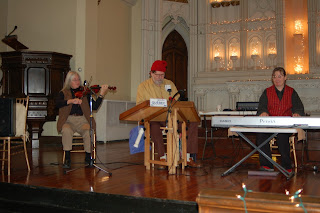Last month I took a chance based on a hunch. I bought a book through Abe Books. It wasn't cheap, especially considering it is just a paperback - $85 with the postage from Canada. It smells a little musty which I don't mind. I am quite at home with with the smell of old musty books. The book title is
Le Bas du Ruisseau Vacher by Therese Melancon-Mireault. It is the story of the eleven founding families of Acadian exiles who were deported to Connecticut and Massachusetts and eventually settling the village of St Jacques de l'Achigan in the seigneury of Saint Sulpice in 1766. Interestingly, many of these exiles traveled from New England to this new promised land via the Hudson-Champlain-Richelieu WaterwayRiver. (That's more than slightly ironic because their descendants emigrated to this area years later). The exiled Acadians called this new land "Nouvelle Acadie". The eleven founding families were:
Amirault or Mirault
Bourgeois
Fontaine
Gaudet
Granger
Jansonne
*****Lord *****
Martin
Melancon
Richard
Robichaud
If you read this blog in past years, you may recall the Lord family are ancestors of the Rivets of Cohoes New York. Maxime Rivet married Marie Lord in St Jacques de L'Achigan on 11 October 1875. Twenty years later they can be found in Cohoes, NY with most of their children including Paul Emilie Rivet, Joseph "Joe" Maxime Rivet, and Armand Rivet.
Le Bas du Ruisseau Vacher actually has a family photograph of Marie Lord's parents (Salomon Lord and Marie Auralie Gagnon) and her adult siblings. Marie is not in the photograph perhaps because she and her husband, Maxime Rivet, had already emigrated to the USA.
The bearded gent in the center is Salomon Lord, father of Marie Lord, grandfather of Paul Emile Rivet and great grandfather of Joseph Albert Rivet, Claire Rivet Yetto, Raymond Rivet. Salomon is also the grandfather of Louis and Harvey Rivet of Cohoes.
Seated on Salomon's right is his wife Marie Aurlie Gagnon. She is the grandmother, the great grandmother and the great great grandmother, etc to the descendants of the Rivets of Cohoes, NY.
I wasn't expecting to find a photograph of ancestors in Le Bas du Ruisseau Vacher. Though I paid through the nose for this book, I can tell you now it is priceless!
Below is a recap of the stories written about Acadians in this blog so far. This list includes some early posts that may not have been well researched but I am reviewing them for accuracy and hope they will "make the cut"!





















